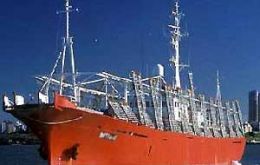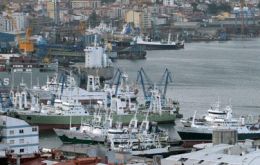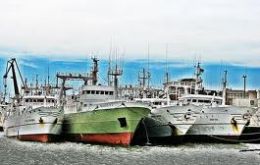MercoPress. South Atlantic News Agency
Fisheries
-
Thursday, December 15th 2011 - 19:53 UTC
Argentina bullying Uruguay on canal dredging and Falkland Islands flagged vessels

Uruguay has banned the docking of Falklands/Malvinas flagged vessel in the port of Montevideo, following on complaints from Argentina that several fishing vessels with that flag, in recent months had been operating from Montevideo.
-
Wednesday, December 14th 2011 - 17:26 UTC
Korea invites China and Japan to help reduce illegal fishing in the Yellow Sea

South Korea will try to reach an agreement with Japan and China to help reduce illegal fishing in its waters following the death of a South Korean Coast Guard this week during a fight with Chinese fishermen who were caught red-handed operating in the Yellow Sea.
-
Wednesday, December 14th 2011 - 16:15 UTC
EU sustainable fishing fails because of fleet overcapacity, says Court of Auditors

The European Court of Auditors, evaluating whether EU measures have contributed to adapting the capacity of EU fishing fleets to available fishing opportunities concluded that current measures have “failed” mostly blaming the ongoing overcapacity of the fishing fleet.
-
Tuesday, December 13th 2011 - 06:39 UTC
Argentina’s attempt to advance the squid season seems condemned to failure

Argentina’s Federal Fisheries Council (CFP) ordered the temporary cancellation of jiggers’ dispatches because of the low catches of squid (Illex argentinus) registered by the five vessels operating south of latitude 44°.
-
Friday, December 9th 2011 - 06:41 UTC
Argentine fish exports stable at 365.372 tons during first ten months of 2011

Argentina exported 365.372 tons of fish and shellfish valued at 1.16 billion dollars in the first ten months of 2011, according to statistics from the National Health Service and Food Quality, Senasa. Hake, shrimp and squid were the three main items in that order.
-
Friday, December 9th 2011 - 06:24 UTC
Falklands condemns Argentina for early opening of the Illex fishery

The new Chair of the Falkland Islands Fishing Company Association condemned Argentina for their two month early opening of their illex (squid) fishing season, “with complete disregard for conservation of the stock”.
-
Wednesday, December 7th 2011 - 02:10 UTC
UK protests to Argentina the interception of Falklands licensed fishing vessels

The UK has protested to Argentina over its interception of Falkland Islands-licensed fishing boats, mainly Spanish in disputed South Atlantic waters and in the River Plate when they approach the port of Montevideo.
-
Monday, December 5th 2011 - 20:32 UTC
Spanish government ‘concerned’ with Argentine harassment of fishing vessels in Falklands’ waters

The Spanish government has expressed ‘concern’ about claims from the Vigo-based fleet operating in the south-west Atlantic which has come under continuous harassment from Argentine naval patrols claiming they are fishing ‘illegally’ in ‘Argentine waters’ in spite of having licences awarded by the Falkland Islands government.
-
Monday, November 28th 2011 - 17:06 UTC
Argentina confirms high seas boarding of Spanish fleet fishing in Falklands

The Argentine government has stepped up its official blockade policy against the Falkland Islands warning Spanish fishing vessels are operating ‘illegally’ in the South Atlantic, since they have not requested licences from the Argentine government, and controls over those activities will continue.
-
Monday, November 21st 2011 - 23:55 UTC
UK praises Overseas Territories for sponsoring measures to protect seabirds

Foreign Office Minister Henry Bellingham has welcomed the UK Overseas Territories important role in agreeing new measures to protect seabirds.
